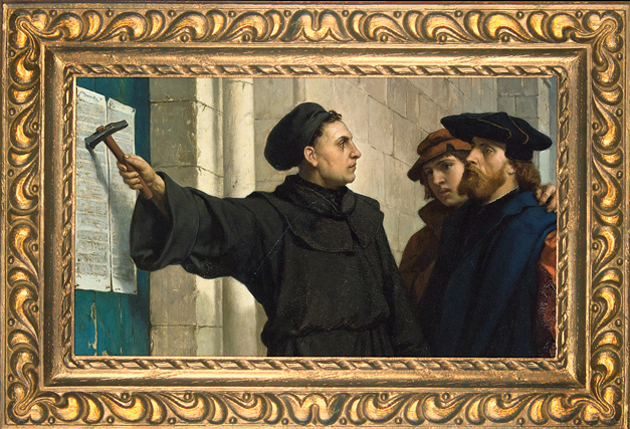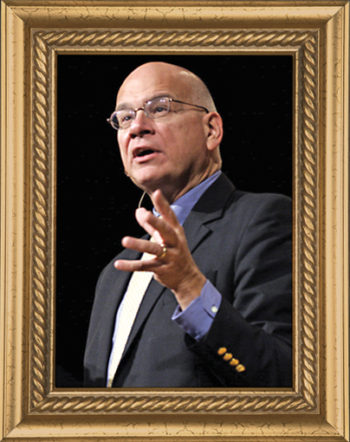“A leader is great, not because of his or her power, but because of his or her ability to empower others.”
– John C. Maxwell, Developing the Leader Within You
Occasionally we experience a glimpse of a great leader, one who manifests the Spirit with such boldness and splendor that God’s presence is easy to recognize. Here we feature two spiritual leaders juxtaposed in history on either side of a 500-year time span: one, a man who wrestled with his own sin and whose courageous actions led to a revolution of spiritual freedom; the other, a modern-day theologian on a mission to embolden others to serve our Mighty God. According to John Maxwell’s definition, both would be considered great leaders—empowering others with the truth and the insight brought by faith.
Martin Luther
Luther’s Greatest Contributions to the Reformation:
• His 95 Theses which challenged the pope’s authority
• His radical views crystalized into three statements:
– Sola Scriptura: Scripture Alone
– Sola Fide: Faith Alone
– Sola Gratia: Grace Alone
• His doctrine of the Priesthood of All Believers, that all Christians are called to be priests
• His translation of the Bible into German
In one moment, a promise made to God during a thunderstorm redefined his character and forever changed the course of his life… and that of future generations. Martin Luther, once brought to his knees on the road to university, would transform the world through his personal quest to find true freedom from sin.
With his thirst for knowledge of God not easily quenched, Luther studied Scripture endlessly while serving the church as an Augustinian monk in 16th century Germany. He earned his doctorate in theology from Wittenberg University and served there as a professor and administrator. The Augustinian order then appointed him a provincial vicar with oversight of 11 monasteries.
Biographies offer a disquieting portrait of Luther’s life as a monk, painting him as a man obsessed with confessing his sins and performing penance to quell an intense instinct to save his own soul. He was plagued by periods of despair and depression, constantly grappling with his sinful nature, and deeply feeling the weight of its abysmal consequence. Soon Luther no longer found consolation in a monk’s ascetic practices; his only solace was the study of God’s Word. He often returned to the dilemma he saw in Romans 1:17: “the righteous shall live by faith” and on one particular day, received a divine revelation of immense clarity: Salvation cannot be earned, but only freely given by God’s grace through faith alone. Contradictory to what he had been taught throughout his studies, this new insight brought him the freedom his soul had been seeking.
When he learned of the pope’s policy of selling indulgences to the poor to pay for decadent church renovations, the fuse was lit. In protest, he wrote his 95 Theses (“Disputation on the Power and Efficacy of Indulgences”) which launched him headfirst into a face-off with the Roman Catholic Church.
The call for church reform gained momentum and soon reached Europe. Luther’s writings were banned as heresy and burned; he was excommunicated by the church and condemned as an outlaw by Emperor Charles V.
As the reform movement took a political shift, Luther allowed others to lead and began his 10-month translation of the New testament into the German language. This was followed by a 10-year project to translate the Old testament which he led with a team of translators at Wittenberg Castle. Soon this all-German Bible became impetus for Bible translation across Europe and, as he had once hoped, God’s Word was accessible to all.
Luther never intended to begin a new religion, but his emerging theology shook the foundations of medieval Christendom. Oen called the father of Protestantism, he was a reluctant revolutionary whose Spirit-inspired teachings altered religion, the Church, and biblical leadership, the effects of which we still see today.
by RJ Flower-Opdycke
Timothy Keller
“Fifty years from now, if evangelical Christians are widely known for their love
of cities, their commitment to mercy and justice, and their love of their neighbors,
Tim Keller will be remembered as a pioneer of the new urban Christians.”
– Christianity Today1
Friend and Colleague
I have known Tim Keller for 45 years, and his wife Kathy even longer (she was a college classmate and close friend at Allegheny College in Pennsylvania). Tim is one of the smartest people I have ever known; our professors at Gordon-Conwell recognized that he would do some great things for God’s kingdom. After graduating from seminary, he served a small church in Hopewell, VA for a few years and then went to Westminster for his doctorate. When he decided to move to New York City (which at that time was considered the “graveyard of churches” because of its heavy secularism), we all wondered if he was delusional. But the Holy Spirit worked in astounding ways, and the church he and Kathy founded became a worldwide model of the power of the historic and Reformed faith when proclaimed without compromise. Tim and Kathy are both cancer survivors, their faith made stronger through the crucible of trial. Tim’s teaching, preaching, and writing have inspired many to enter the pastoral ministry, including some of the young seminary students First Church has been privileged to mentor.
Pastor Doug Pratt
Presbyterian minister timothy Keller has much in common with his spiritual forefather Martin Luther. A reputable theologian and pastor in the Presbyterian Church of America, Keller has helped establish over 600 churches and is in high demand as a speaker and lecturer. Like Luther, he saw individuals who needed someone to speak their language and to help them embrace their journey of faith.
Educated at the Gordon-Conwell and Westminster Theological Seminaries (the alma maters of pastors Doug Pratt and Steven Grant, respectively), Dr. Keller made a name for himself in founding Redeemer Presbyterian Church in Manhattan—a place where both believers and skeptics were welcomed.
From the beginning, his own faith journey was rooted in logic. When interviewed last year for The Atlantic magazine, he said:
I took the rational path, I would say, toward being a Christian… I don’t trust my feelings. And if I was going to embrace Christianity fully, I wanted to really believe it was intellectually credible… I tend to think a fully formed Christian is somebody who finds Christianity both rationally and intellectually credible, but also emotionally and existentially true and satisfying.2
We can attribute Keller’s evangelical success to his intellectual approach to draw in Manhattan’s high-achieving skeptics. He first allowed the city to mentor him, absorbing everything about the people and culture, in order to create an effective ministry strategy. Because New Yorkers were cynical, previous Christian outreaches had felt like sales pitches. Keller recognized that Manhattanites needed authenticity over “feel good” messages. Even though many religious leaders doubted his approach could succeed in New York City he pushed forward, centering his ministry around each individual, meeting each person where he or she was, and successfully cultivating a thriving evangelical community in a city known for its skepticism. He said of his church:
…We wanted to be a place where those who were not believers (or who were not sure what they believed) would find their questions welcomed and addressed, their doubts and difficulties respected… Over time, many of them discovered the Redeemer community to be an “incubator” where they were able to see the reasonable beauty of the Christian gospel and discover their own faith developing and growing.3
The Skeptics Welcome program, a concept Keller was exposed to as a student, opened Redeemer to the community, offering an outlet for non-believers to fulfill their curiosity and for believers to face their doubt. This philosophy cultivated the most successful evangelical community in the city, allowing Redeemer to grow from a congregation of 100 to one with 5,000 regular attendees and multiple campuses across New York City. Keller attributes their success to individualized evangelism. The church’s growth was in the congregation’s hands, relying on members to extend invitations to neighbors and friends.
Keller was urged to write although he felt he was more of an orator. The Reason for God and The Prodigal God were penned in 2008 for skeptics and believers alike. Both books quickly became New York Times bestsellers with over two million copies translated into 25 languages. Since then, Keller has used his preaching ministry as a foundation for writing 18 books on everything from marriage to church planting.
In July 2017, Keller stepped down as Redeemer’s Senior Pastor as a part of his ten-year plan which included creating the Redeemer movement. As churches age, they often become dependent on a small group of leaders and stop growing; Keller wanted something different. He chose to divide and conquer by sending leaders out into the city to plant more churches instead of ramping up their own programming.
Keller found when people are placed in a position of leadership, they rise to the occasion. This resulted in new outreaches seeing dramatic growth. He believed that developing leadership at the most fundamental level allows the Church to send everyone into the mission field—which often starts in their own backyards.
Since retiring Keller hasn’t slowed down. As chairman and co-founder of Redeemer City to City, he has helped plant over 600 churches in cities worldwide. He now works with City to City full-time, investing in a new generation of Christian leaders and imparting the knowledge he acquired throughout his ministry.
From Keller’s legacy we learn that cultivating strong leaders and empowering mentees enriches God’s Kingdom. It is not only beneficial, it is necessary that we share our own knowledge and life experiences in order to equip future generations for success in ministry.
by Sophia Sierts
1 Excerpt from the introduction to “A New Kind of Urban Christian” by Tim Keller, May 1, 2006, Christianity Today, christianitytoday.com/ct/2006/may/1.36.html.
2 Peter Wehner, “The Moral Universe of Timothy Keller.” The Atlantic, December 5, 2019, theatlantic.com/ideas/archive/2019/12/timothy-kellers-moraluniverse/603001.
3 “Public Faith: Skeptics Welcome.” Redeemer Church & Ministries, redeemer.com/ skeptics_welcome.







